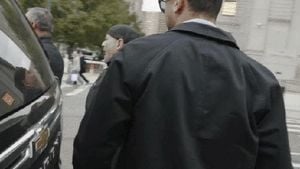Wayne Rooney, the legendary former England and Manchester United striker, has stepped into the spotlight once again—this time, not for his exploits on the pitch, but for his impassioned call to action against racism in football. In the wake of a disturbing incident at Anfield involving Bournemouth forward Antoine Semenyo, Rooney’s voice has added weight to a growing demand for stronger anti-racism measures across the sport.
The Premier League’s opening weekend was supposed to be about football’s return, but the match between Bournemouth and Liverpool on August 15, 2025, was marred by an ugly episode. In the 29th minute, play was temporarily halted when Semenyo reported being racially abused by someone in the crowd. The swift response saw a 47-year-old man from Liverpool arrested on suspicion of a racially aggravated public order offence, banned from every football stadium in the UK, and conditionally bailed. But for many, including Rooney, these actions—while necessary—are only part of a larger solution.
Rooney, speaking candidly on his new BBC podcast, the Wayne Rooney Show, recounted a harrowing memory from his managerial stint at Major League Soccer’s DC United. “I had it in DC with one of my players who got racially abused and he was crying on my chest. I was holding him as he was crying on my chest,” Rooney revealed, his words tinged with emotion. “I don’t think people realise – they say it as a throwaway line that they think has no meaning behind it, but it hurts people. For people to see that and understand, there has to be more done to stop it.”
It’s a moment that clearly left a mark on Rooney, and it’s one he believes should serve as a wake-up call for the entire football community. He isn’t alone in thinking that the current response to racist incidents—however swift—doesn’t go far enough. Rooney wants to see a wholesale shift in how football, and society at large, handles racism. “There needs to be a strong campaign for society – for children, parents and grandparents – to be educated,” he insisted. “You have to hit the clubs because that’s the only way it will stop. If there is ignorance, the fans will still do it.”
Rooney’s proposed solution is as bold as it is direct: clubs should face real consequences when their supporters are implicated in racist abuse. “You have to hit the clubs by taking off points or hit them in the pocket and take money away from them. Otherwise, it will keep on going,” he argued. “Hopefully the right people sit down with the right organisations to try and get something serious in place.”
Rooney’s comments come at a time when the Football Association (FA) is already empowered to take significant action against clubs that fail to respond adequately to racist abuse. According to FA rule E20.1, the governing body can impose financial penalties or even enforce partial or full stadium closures for clubs found guilty of not acting on reports of racist behavior. In a notable case from 2023, League Two side Gillingham was fined £12,500 for three counts of misconduct after their supporters were found to have engaged in racist and sexist abuse.
But are these measures enough? Rooney, and many others, believe the answer is no. The emotional toll on players is evident, not only from Rooney’s DC United anecdote but also from the visible distress of Semenyo at Anfield. After the incident, Bournemouth moved quickly to ensure Semenyo would receive support, turning to the Professional Footballers’ Association (PFA) for assistance. The club’s actions reflect a growing recognition that players need more than just public condemnation of abuse—they need concrete support and the assurance that their employers and the wider footballing community are truly on their side.
The incident at Anfield has reignited debates about the effectiveness of current anti-racism measures in English football. While the swift arrest and lifetime stadium ban for the alleged perpetrator demonstrate that authorities are taking such reports seriously, the recurrence of these incidents suggests that deeper, systemic issues remain unresolved. Rooney’s call for education campaigns targeting all ages—children, parents, and grandparents—underscores the need for a cultural shift, not just in football but in society as a whole.
It’s a sentiment echoed by many within the game. The FA’s ability to fine clubs or close stadiums is a powerful tool, but as Rooney points out, it’s the consistent and meaningful application of such sanctions that will drive real change. Financial penalties and points deductions hit clubs where it hurts most—their reputation and their competitive standing. These are the kinds of consequences that, in Rooney’s view, could finally force clubs to take a zero-tolerance approach to racism among their supporters.
The Premier League, for its part, has made strides in recent years, launching high-profile campaigns and working with organizations like Kick It Out to promote diversity and inclusion. Yet, as the Anfield incident shows, the job is far from done. Players like Semenyo, who bravely speak out, are still subjected to abuse that can have lasting emotional impacts. The support from the PFA is crucial, but as Rooney’s story illustrates, the pain of such experiences lingers long after the final whistle.
For fans, the message is clear: racism has no place in football, and those who engage in it will face serious consequences. But the responsibility doesn’t end with individual fans or even clubs. As Rooney and others have argued, eradicating racism from the game requires a concerted effort from all corners of society. Education, strong sanctions, and unwavering support for victims must go hand in hand if football is to become truly inclusive.
As the Premier League season continues, all eyes will be on how clubs, the FA, and the wider footballing community respond to Rooney’s call to action. Will there be a renewed push for education and tougher penalties? Or will these incidents continue to cast a shadow over the beautiful game? One thing is certain: players like Antoine Semenyo, and advocates like Wayne Rooney, aren’t willing to let the issue fade into the background.
With the world watching, the next steps taken by football’s leaders could shape the future of the sport for generations to come. For now, the conversation sparked by Rooney’s heartfelt words and Semenyo’s courage is pushing football to confront its demons head-on—and perhaps, finally, to make lasting change.




